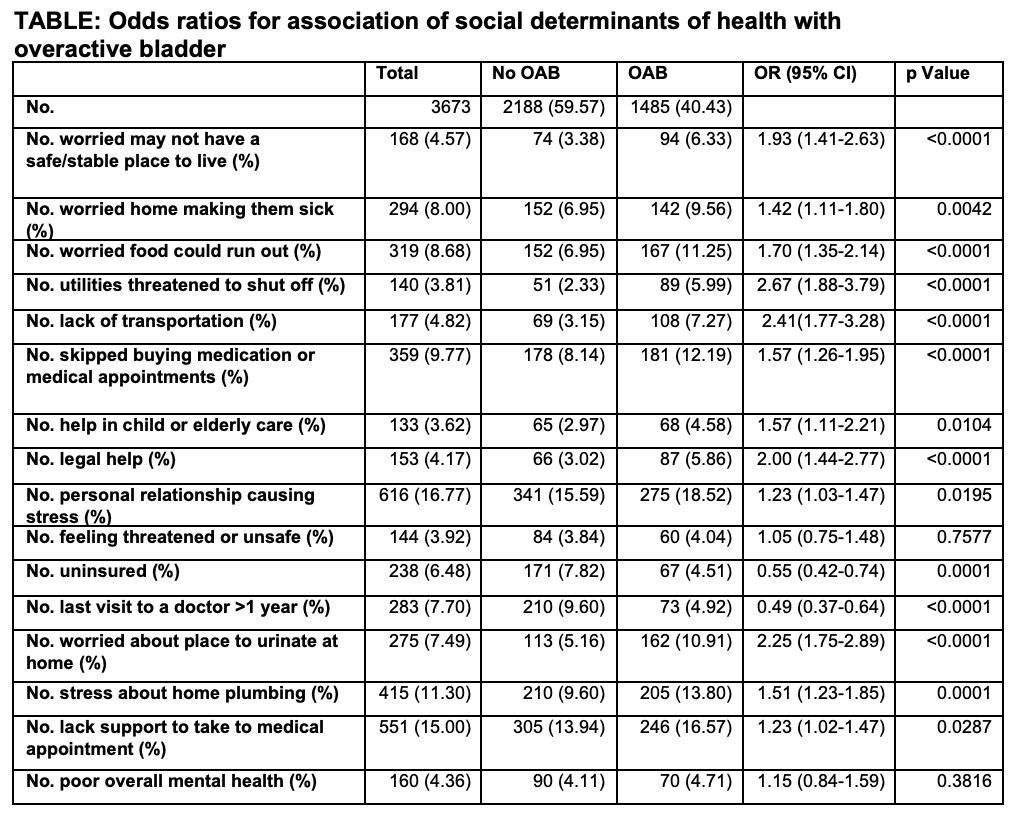Back
Poster, Podium & Video Sessions
Podium
PD25: Health Services Research: Practice Patterns, Quality of Life and Shared Decision Making II
PD25-01: Social Determinants of Health and Overactive Bladder in a Large Nationwide Cross-Sectional Study
Saturday, May 14, 2022
9:30 AM – 9:40 AM
Location: Room 244
Elisabeth Sebesta*, Stephanie Gleicher, Melissa Kaufman, Roger Dmochowski, W. Stuart Reynolds, Nashville, TN

Elisabeth Sebesta, MD
Vanderbilt University Medical Center
Podium Presenter(s)
Introduction: There is growing interest in how social determinants of health (SDOH) may explain relationships between social conditions and health. Overactive bladder (OAB) is common in the United States, posing a significant public health burden. Previously, lower socioeconomic status has been associated with more severe urge urinary incontinence (UUI). Most recently, a multicenter cross-sectional study demonstrated a link between certain SDOH and OAB severity in women in an urban setting. It was the goal of the present study to assess whether OAB was associated with unmet social needs in a large nationwide cross-sectional sample of patients.
Methods: A community-based sample of adult patients was recruited electronically to complete questionnaires on clinical and demographic information, urinary symptoms (LURN SI-10 and ICIQ-SF UI), and social needs. Excluded patients were currently pregnant, with history of cystectomy or neurologic lower urinary tract dysfunction. Variables were assessed with multivariable logistic regression.
Results: A total of 3,673 patients were included for analysis, with a mean age of 40.7±17.3 years. The majority of patients identified as white, non-Hispanic (84.0%) and female (77.1%). Of all patients, 1,485 (40.4%) were classified as having OAB (UUI in a 7-day period and/or urgency with frequency >8 times/day). The presence of OAB was associated with numerous unmet social needs, including worry about a stable/safe place to live, food insecurity, worry about utilities, lack of transportation, skipping medical appointments, needing legal help, stress in personal relationships, worry about a place to urinate at home, stress about home plumbing, and lack of social supports (TABLE). On multivariable analysis adjusting for age, gender, race, BMI, parity, and history of pelvic radiation or surgeries, all associations between OAB and SDOH remained significant.
Conclusions: In this large nationwide sample, multiple SDOH were associated with the presence of OAB, which may have implications on the overall management of OAB patients. As providers it is important to consider these unmet social needs of patients, and suggests a role for collaboration with social workers and/or mental health providers in order to offer OAB patients with the best and most comprehensive care.
Source of Funding: UL1 TR000445 from NCATS/NIH

Methods: A community-based sample of adult patients was recruited electronically to complete questionnaires on clinical and demographic information, urinary symptoms (LURN SI-10 and ICIQ-SF UI), and social needs. Excluded patients were currently pregnant, with history of cystectomy or neurologic lower urinary tract dysfunction. Variables were assessed with multivariable logistic regression.
Results: A total of 3,673 patients were included for analysis, with a mean age of 40.7±17.3 years. The majority of patients identified as white, non-Hispanic (84.0%) and female (77.1%). Of all patients, 1,485 (40.4%) were classified as having OAB (UUI in a 7-day period and/or urgency with frequency >8 times/day). The presence of OAB was associated with numerous unmet social needs, including worry about a stable/safe place to live, food insecurity, worry about utilities, lack of transportation, skipping medical appointments, needing legal help, stress in personal relationships, worry about a place to urinate at home, stress about home plumbing, and lack of social supports (TABLE). On multivariable analysis adjusting for age, gender, race, BMI, parity, and history of pelvic radiation or surgeries, all associations between OAB and SDOH remained significant.
Conclusions: In this large nationwide sample, multiple SDOH were associated with the presence of OAB, which may have implications on the overall management of OAB patients. As providers it is important to consider these unmet social needs of patients, and suggests a role for collaboration with social workers and/or mental health providers in order to offer OAB patients with the best and most comprehensive care.
Source of Funding: UL1 TR000445 from NCATS/NIH


.jpg)
.jpg)